Business Law and Ethics: UK Employment Law Evolution & Contract Law
VerifiedAdded on 2023/06/13
|6
|1846
|463
Essay
AI Summary
This essay delves into the evolution of UK employment laws since the 1970s, highlighting key legislation such as the Equal Pay Act, Trade Union and Labour Relations Act, and subsequent amendments addressing discrimination, working hours, and parental leave. It also elucidates the essential elements required for a valid contract, including agreement, contractual intention, and consideration, supported by relevant case law examples. The essay concludes by emphasizing the interconnectedness of law and ethics in business regulation and the necessity for continuous legislative updates to address contemporary needs.
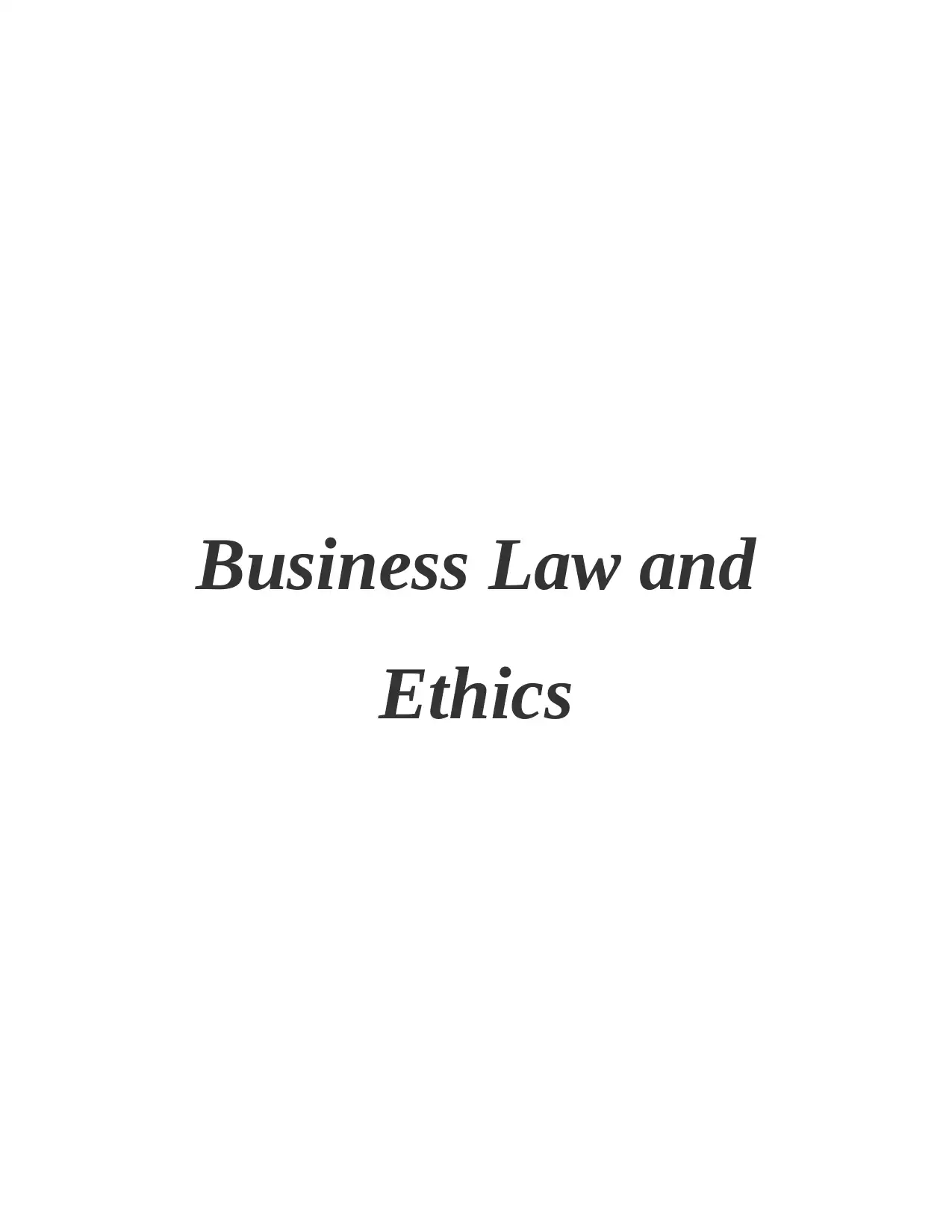
Business Law and
Ethics
Ethics
Paraphrase This Document
Need a fresh take? Get an instant paraphrase of this document with our AI Paraphraser
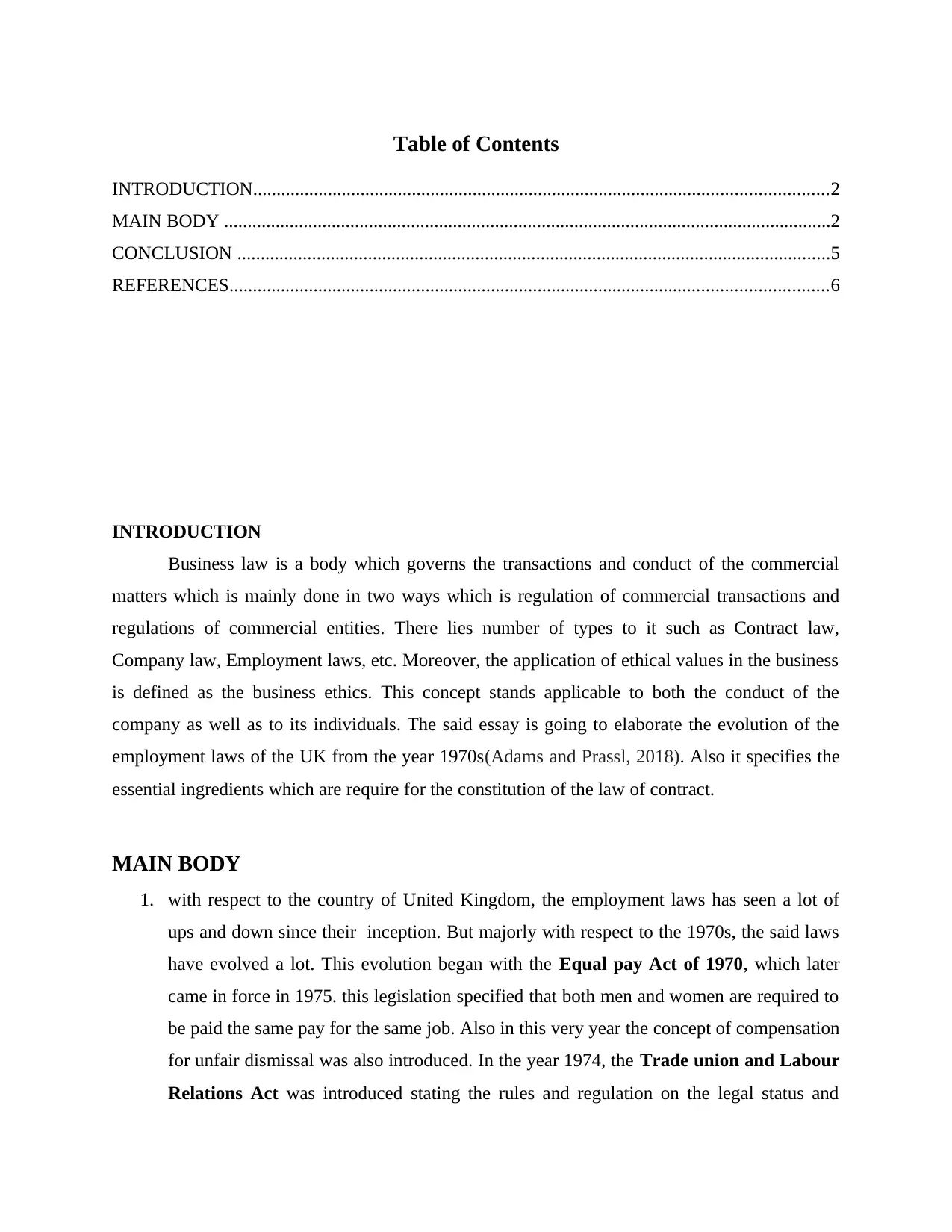
Table of Contents
INTRODUCTION...........................................................................................................................2
MAIN BODY ..................................................................................................................................2
CONCLUSION ...............................................................................................................................5
REFERENCES................................................................................................................................6
INTRODUCTION
Business law is a body which governs the transactions and conduct of the commercial
matters which is mainly done in two ways which is regulation of commercial transactions and
regulations of commercial entities. There lies number of types to it such as Contract law,
Company law, Employment laws, etc. Moreover, the application of ethical values in the business
is defined as the business ethics. This concept stands applicable to both the conduct of the
company as well as to its individuals. The said essay is going to elaborate the evolution of the
employment laws of the UK from the year 1970s(Adams and Prassl, 2018). Also it specifies the
essential ingredients which are require for the constitution of the law of contract.
MAIN BODY
1. with respect to the country of United Kingdom, the employment laws has seen a lot of
ups and down since their inception. But majorly with respect to the 1970s, the said laws
have evolved a lot. This evolution began with the Equal pay Act of 1970, which later
came in force in 1975. this legislation specified that both men and women are required to
be paid the same pay for the same job. Also in this very year the concept of compensation
for unfair dismissal was also introduced. In the year 1974, the Trade union and Labour
Relations Act was introduced stating the rules and regulation on the legal status and
INTRODUCTION...........................................................................................................................2
MAIN BODY ..................................................................................................................................2
CONCLUSION ...............................................................................................................................5
REFERENCES................................................................................................................................6
INTRODUCTION
Business law is a body which governs the transactions and conduct of the commercial
matters which is mainly done in two ways which is regulation of commercial transactions and
regulations of commercial entities. There lies number of types to it such as Contract law,
Company law, Employment laws, etc. Moreover, the application of ethical values in the business
is defined as the business ethics. This concept stands applicable to both the conduct of the
company as well as to its individuals. The said essay is going to elaborate the evolution of the
employment laws of the UK from the year 1970s(Adams and Prassl, 2018). Also it specifies the
essential ingredients which are require for the constitution of the law of contract.
MAIN BODY
1. with respect to the country of United Kingdom, the employment laws has seen a lot of
ups and down since their inception. But majorly with respect to the 1970s, the said laws
have evolved a lot. This evolution began with the Equal pay Act of 1970, which later
came in force in 1975. this legislation specified that both men and women are required to
be paid the same pay for the same job. Also in this very year the concept of compensation
for unfair dismissal was also introduced. In the year 1974, the Trade union and Labour
Relations Act was introduced stating the rules and regulation on the legal status and
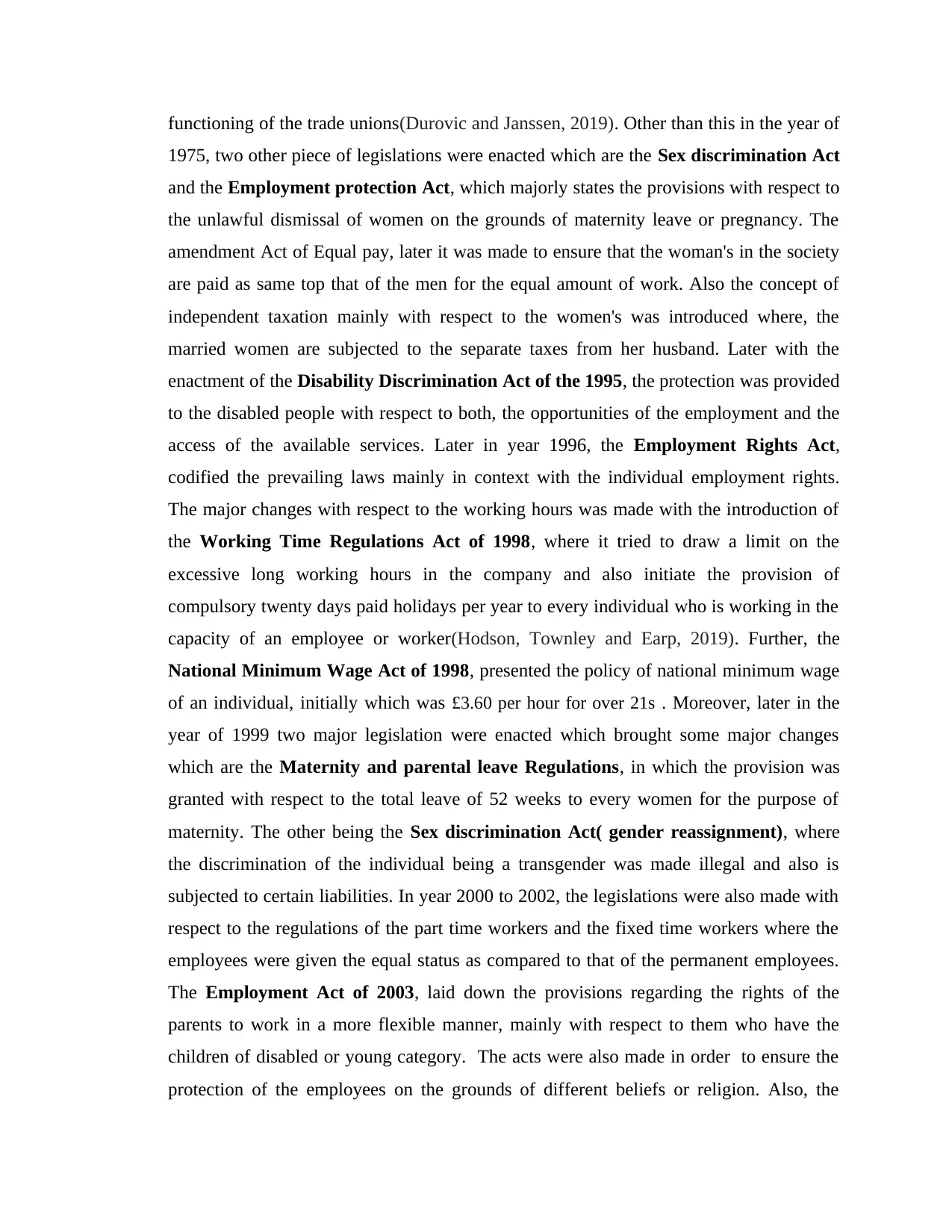
functioning of the trade unions(Durovic and Janssen, 2019). Other than this in the year of
1975, two other piece of legislations were enacted which are the Sex discrimination Act
and the Employment protection Act, which majorly states the provisions with respect to
the unlawful dismissal of women on the grounds of maternity leave or pregnancy. The
amendment Act of Equal pay, later it was made to ensure that the woman's in the society
are paid as same top that of the men for the equal amount of work. Also the concept of
independent taxation mainly with respect to the women's was introduced where, the
married women are subjected to the separate taxes from her husband. Later with the
enactment of the Disability Discrimination Act of the 1995, the protection was provided
to the disabled people with respect to both, the opportunities of the employment and the
access of the available services. Later in year 1996, the Employment Rights Act,
codified the prevailing laws mainly in context with the individual employment rights.
The major changes with respect to the working hours was made with the introduction of
the Working Time Regulations Act of 1998, where it tried to draw a limit on the
excessive long working hours in the company and also initiate the provision of
compulsory twenty days paid holidays per year to every individual who is working in the
capacity of an employee or worker(Hodson, Townley and Earp, 2019). Further, the
National Minimum Wage Act of 1998, presented the policy of national minimum wage
of an individual, initially which was £3.60 per hour for over 21s . Moreover, later in the
year of 1999 two major legislation were enacted which brought some major changes
which are the Maternity and parental leave Regulations, in which the provision was
granted with respect to the total leave of 52 weeks to every women for the purpose of
maternity. The other being the Sex discrimination Act( gender reassignment), where
the discrimination of the individual being a transgender was made illegal and also is
subjected to certain liabilities. In year 2000 to 2002, the legislations were also made with
respect to the regulations of the part time workers and the fixed time workers where the
employees were given the equal status as compared to that of the permanent employees.
The Employment Act of 2003, laid down the provisions regarding the rights of the
parents to work in a more flexible manner, mainly with respect to them who have the
children of disabled or young category. The acts were also made in order to ensure the
protection of the employees on the grounds of different beliefs or religion. Also, the
1975, two other piece of legislations were enacted which are the Sex discrimination Act
and the Employment protection Act, which majorly states the provisions with respect to
the unlawful dismissal of women on the grounds of maternity leave or pregnancy. The
amendment Act of Equal pay, later it was made to ensure that the woman's in the society
are paid as same top that of the men for the equal amount of work. Also the concept of
independent taxation mainly with respect to the women's was introduced where, the
married women are subjected to the separate taxes from her husband. Later with the
enactment of the Disability Discrimination Act of the 1995, the protection was provided
to the disabled people with respect to both, the opportunities of the employment and the
access of the available services. Later in year 1996, the Employment Rights Act,
codified the prevailing laws mainly in context with the individual employment rights.
The major changes with respect to the working hours was made with the introduction of
the Working Time Regulations Act of 1998, where it tried to draw a limit on the
excessive long working hours in the company and also initiate the provision of
compulsory twenty days paid holidays per year to every individual who is working in the
capacity of an employee or worker(Hodson, Townley and Earp, 2019). Further, the
National Minimum Wage Act of 1998, presented the policy of national minimum wage
of an individual, initially which was £3.60 per hour for over 21s . Moreover, later in the
year of 1999 two major legislation were enacted which brought some major changes
which are the Maternity and parental leave Regulations, in which the provision was
granted with respect to the total leave of 52 weeks to every women for the purpose of
maternity. The other being the Sex discrimination Act( gender reassignment), where
the discrimination of the individual being a transgender was made illegal and also is
subjected to certain liabilities. In year 2000 to 2002, the legislations were also made with
respect to the regulations of the part time workers and the fixed time workers where the
employees were given the equal status as compared to that of the permanent employees.
The Employment Act of 2003, laid down the provisions regarding the rights of the
parents to work in a more flexible manner, mainly with respect to them who have the
children of disabled or young category. The acts were also made in order to ensure the
protection of the employees on the grounds of different beliefs or religion. Also, the
⊘ This is a preview!⊘
Do you want full access?
Subscribe today to unlock all pages.

Trusted by 1+ million students worldwide
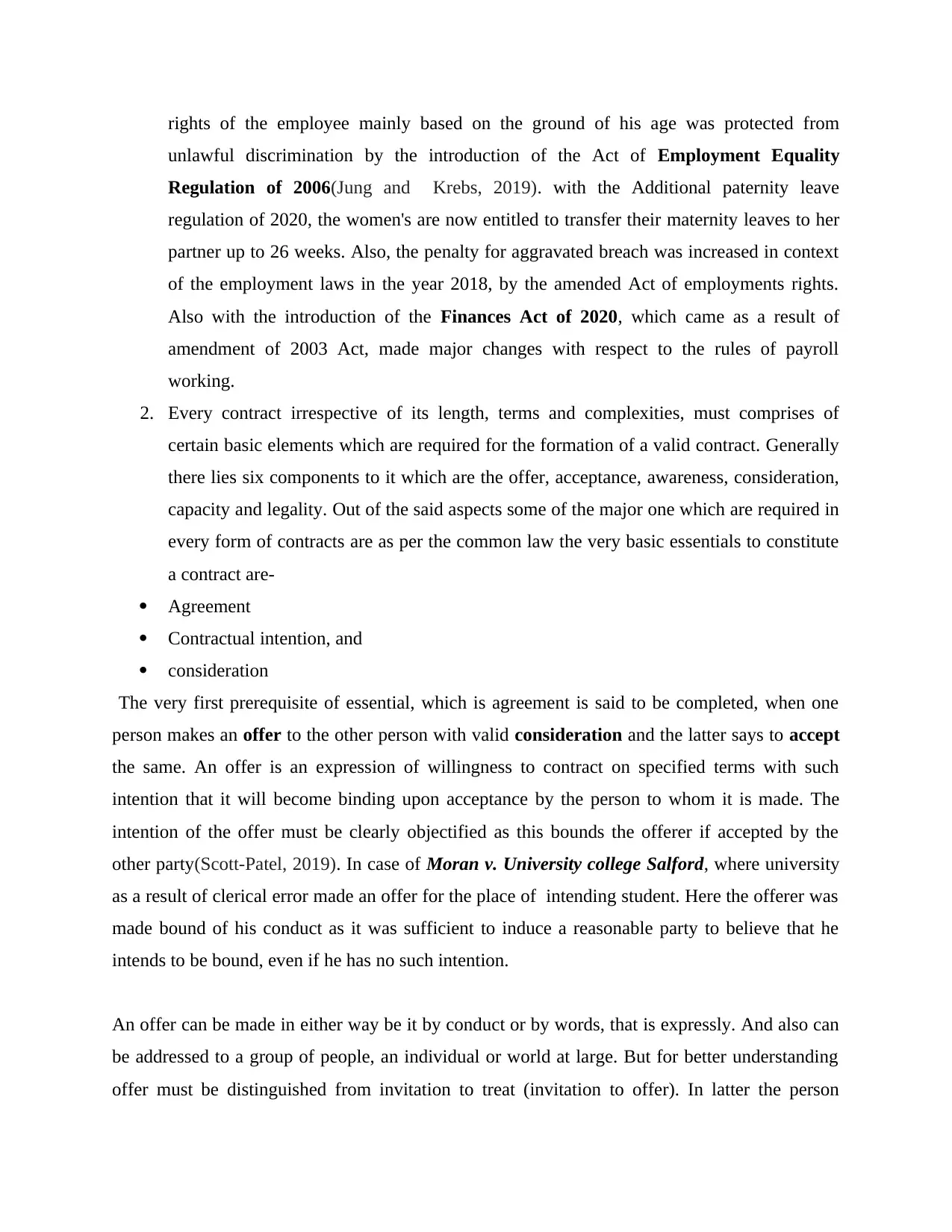
rights of the employee mainly based on the ground of his age was protected from
unlawful discrimination by the introduction of the Act of Employment Equality
Regulation of 2006(Jung and Krebs, 2019). with the Additional paternity leave
regulation of 2020, the women's are now entitled to transfer their maternity leaves to her
partner up to 26 weeks. Also, the penalty for aggravated breach was increased in context
of the employment laws in the year 2018, by the amended Act of employments rights.
Also with the introduction of the Finances Act of 2020, which came as a result of
amendment of 2003 Act, made major changes with respect to the rules of payroll
working.
2. Every contract irrespective of its length, terms and complexities, must comprises of
certain basic elements which are required for the formation of a valid contract. Generally
there lies six components to it which are the offer, acceptance, awareness, consideration,
capacity and legality. Out of the said aspects some of the major one which are required in
every form of contracts are as per the common law the very basic essentials to constitute
a contract are-
Agreement
Contractual intention, and
consideration
The very first prerequisite of essential, which is agreement is said to be completed, when one
person makes an offer to the other person with valid consideration and the latter says to accept
the same. An offer is an expression of willingness to contract on specified terms with such
intention that it will become binding upon acceptance by the person to whom it is made. The
intention of the offer must be clearly objectified as this bounds the offerer if accepted by the
other party(Scott-Patel, 2019). In case of Moran v. University college Salford, where university
as a result of clerical error made an offer for the place of intending student. Here the offerer was
made bound of his conduct as it was sufficient to induce a reasonable party to believe that he
intends to be bound, even if he has no such intention.
An offer can be made in either way be it by conduct or by words, that is expressly. And also can
be addressed to a group of people, an individual or world at large. But for better understanding
offer must be distinguished from invitation to treat (invitation to offer). In latter the person
unlawful discrimination by the introduction of the Act of Employment Equality
Regulation of 2006(Jung and Krebs, 2019). with the Additional paternity leave
regulation of 2020, the women's are now entitled to transfer their maternity leaves to her
partner up to 26 weeks. Also, the penalty for aggravated breach was increased in context
of the employment laws in the year 2018, by the amended Act of employments rights.
Also with the introduction of the Finances Act of 2020, which came as a result of
amendment of 2003 Act, made major changes with respect to the rules of payroll
working.
2. Every contract irrespective of its length, terms and complexities, must comprises of
certain basic elements which are required for the formation of a valid contract. Generally
there lies six components to it which are the offer, acceptance, awareness, consideration,
capacity and legality. Out of the said aspects some of the major one which are required in
every form of contracts are as per the common law the very basic essentials to constitute
a contract are-
Agreement
Contractual intention, and
consideration
The very first prerequisite of essential, which is agreement is said to be completed, when one
person makes an offer to the other person with valid consideration and the latter says to accept
the same. An offer is an expression of willingness to contract on specified terms with such
intention that it will become binding upon acceptance by the person to whom it is made. The
intention of the offer must be clearly objectified as this bounds the offerer if accepted by the
other party(Scott-Patel, 2019). In case of Moran v. University college Salford, where university
as a result of clerical error made an offer for the place of intending student. Here the offerer was
made bound of his conduct as it was sufficient to induce a reasonable party to believe that he
intends to be bound, even if he has no such intention.
An offer can be made in either way be it by conduct or by words, that is expressly. And also can
be addressed to a group of people, an individual or world at large. But for better understanding
offer must be distinguished from invitation to treat (invitation to offer). In latter the person
Paraphrase This Document
Need a fresh take? Get an instant paraphrase of this document with our AI Paraphraser
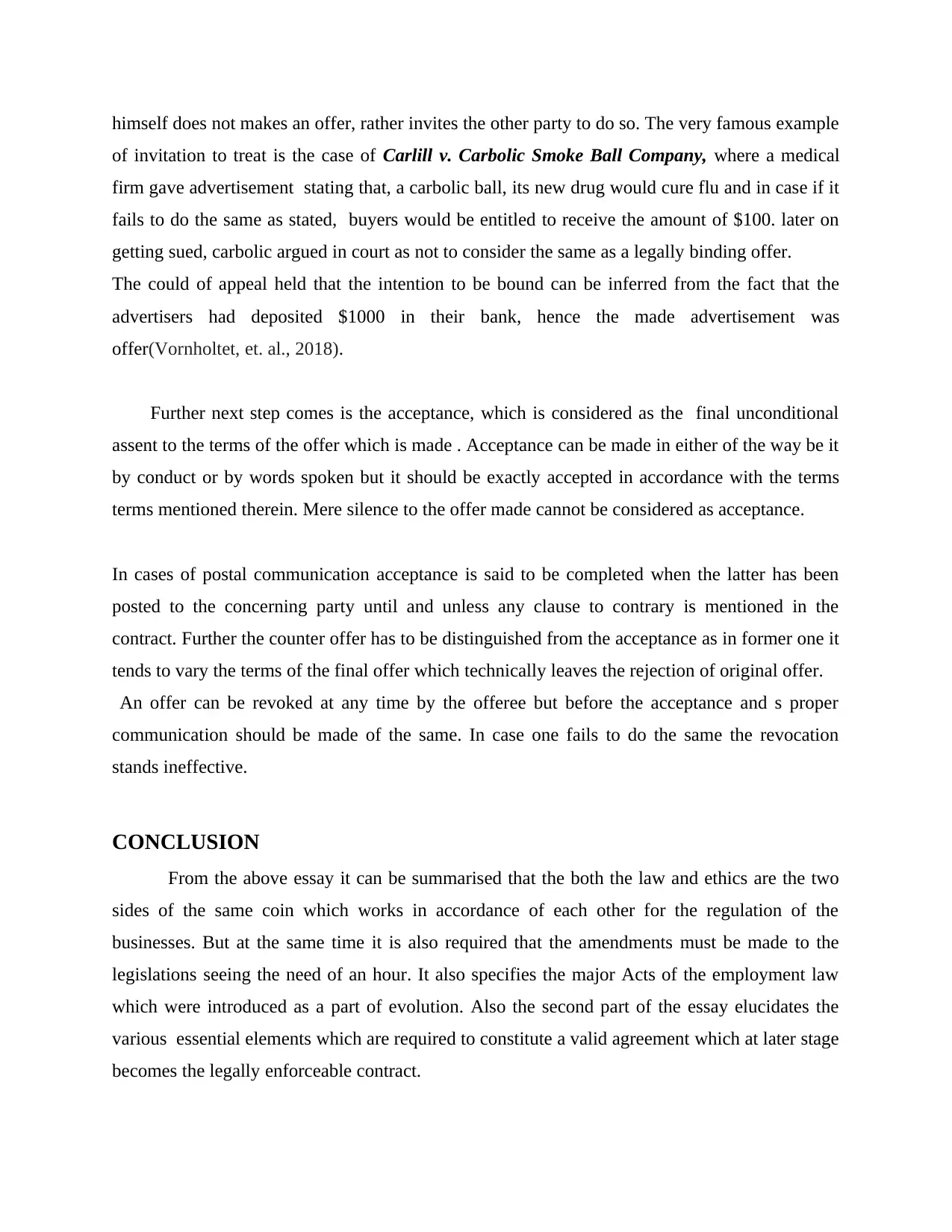
himself does not makes an offer, rather invites the other party to do so. The very famous example
of invitation to treat is the case of Carlill v. Carbolic Smoke Ball Company, where a medical
firm gave advertisement stating that, a carbolic ball, its new drug would cure flu and in case if it
fails to do the same as stated, buyers would be entitled to receive the amount of $100. later on
getting sued, carbolic argued in court as not to consider the same as a legally binding offer.
The could of appeal held that the intention to be bound can be inferred from the fact that the
advertisers had deposited $1000 in their bank, hence the made advertisement was
offer(Vornholtet, et. al., 2018).
Further next step comes is the acceptance, which is considered as the final unconditional
assent to the terms of the offer which is made . Acceptance can be made in either of the way be it
by conduct or by words spoken but it should be exactly accepted in accordance with the terms
terms mentioned therein. Mere silence to the offer made cannot be considered as acceptance.
In cases of postal communication acceptance is said to be completed when the latter has been
posted to the concerning party until and unless any clause to contrary is mentioned in the
contract. Further the counter offer has to be distinguished from the acceptance as in former one it
tends to vary the terms of the final offer which technically leaves the rejection of original offer.
An offer can be revoked at any time by the offeree but before the acceptance and s proper
communication should be made of the same. In case one fails to do the same the revocation
stands ineffective.
CONCLUSION
From the above essay it can be summarised that the both the law and ethics are the two
sides of the same coin which works in accordance of each other for the regulation of the
businesses. But at the same time it is also required that the amendments must be made to the
legislations seeing the need of an hour. It also specifies the major Acts of the employment law
which were introduced as a part of evolution. Also the second part of the essay elucidates the
various essential elements which are required to constitute a valid agreement which at later stage
becomes the legally enforceable contract.
of invitation to treat is the case of Carlill v. Carbolic Smoke Ball Company, where a medical
firm gave advertisement stating that, a carbolic ball, its new drug would cure flu and in case if it
fails to do the same as stated, buyers would be entitled to receive the amount of $100. later on
getting sued, carbolic argued in court as not to consider the same as a legally binding offer.
The could of appeal held that the intention to be bound can be inferred from the fact that the
advertisers had deposited $1000 in their bank, hence the made advertisement was
offer(Vornholtet, et. al., 2018).
Further next step comes is the acceptance, which is considered as the final unconditional
assent to the terms of the offer which is made . Acceptance can be made in either of the way be it
by conduct or by words spoken but it should be exactly accepted in accordance with the terms
terms mentioned therein. Mere silence to the offer made cannot be considered as acceptance.
In cases of postal communication acceptance is said to be completed when the latter has been
posted to the concerning party until and unless any clause to contrary is mentioned in the
contract. Further the counter offer has to be distinguished from the acceptance as in former one it
tends to vary the terms of the final offer which technically leaves the rejection of original offer.
An offer can be revoked at any time by the offeree but before the acceptance and s proper
communication should be made of the same. In case one fails to do the same the revocation
stands ineffective.
CONCLUSION
From the above essay it can be summarised that the both the law and ethics are the two
sides of the same coin which works in accordance of each other for the regulation of the
businesses. But at the same time it is also required that the amendments must be made to the
legislations seeing the need of an hour. It also specifies the major Acts of the employment law
which were introduced as a part of evolution. Also the second part of the essay elucidates the
various essential elements which are required to constitute a valid agreement which at later stage
becomes the legally enforceable contract.
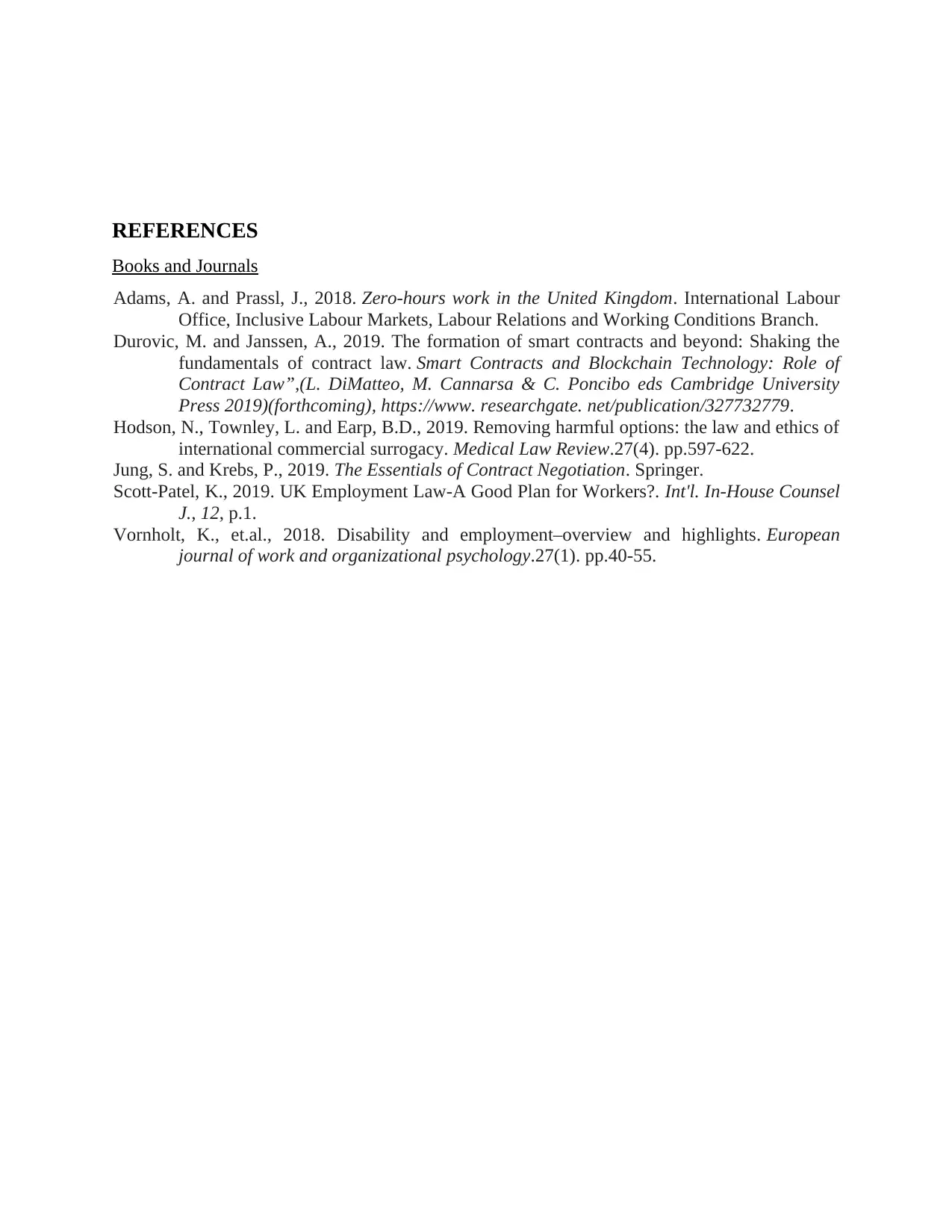
REFERENCES
Books and Journals
Adams, A. and Prassl, J., 2018. Zero-hours work in the United Kingdom. International Labour
Office, Inclusive Labour Markets, Labour Relations and Working Conditions Branch.
Durovic, M. and Janssen, A., 2019. The formation of smart contracts and beyond: Shaking the
fundamentals of contract law. Smart Contracts and Blockchain Technology: Role of
Contract Law”,(L. DiMatteo, M. Cannarsa & C. Poncibo eds Cambridge University
Press 2019)(forthcoming), https://www. researchgate. net/publication/327732779.
Hodson, N., Townley, L. and Earp, B.D., 2019. Removing harmful options: the law and ethics of
international commercial surrogacy. Medical Law Review.27(4). pp.597-622.
Jung, S. and Krebs, P., 2019. The Essentials of Contract Negotiation. Springer.
Scott-Patel, K., 2019. UK Employment Law-A Good Plan for Workers?. Int'l. In-House Counsel
J., 12, p.1.
Vornholt, K., et.al., 2018. Disability and employment–overview and highlights. European
journal of work and organizational psychology.27(1). pp.40-55.
Books and Journals
Adams, A. and Prassl, J., 2018. Zero-hours work in the United Kingdom. International Labour
Office, Inclusive Labour Markets, Labour Relations and Working Conditions Branch.
Durovic, M. and Janssen, A., 2019. The formation of smart contracts and beyond: Shaking the
fundamentals of contract law. Smart Contracts and Blockchain Technology: Role of
Contract Law”,(L. DiMatteo, M. Cannarsa & C. Poncibo eds Cambridge University
Press 2019)(forthcoming), https://www. researchgate. net/publication/327732779.
Hodson, N., Townley, L. and Earp, B.D., 2019. Removing harmful options: the law and ethics of
international commercial surrogacy. Medical Law Review.27(4). pp.597-622.
Jung, S. and Krebs, P., 2019. The Essentials of Contract Negotiation. Springer.
Scott-Patel, K., 2019. UK Employment Law-A Good Plan for Workers?. Int'l. In-House Counsel
J., 12, p.1.
Vornholt, K., et.al., 2018. Disability and employment–overview and highlights. European
journal of work and organizational psychology.27(1). pp.40-55.
⊘ This is a preview!⊘
Do you want full access?
Subscribe today to unlock all pages.

Trusted by 1+ million students worldwide
1 out of 6
Related Documents
Your All-in-One AI-Powered Toolkit for Academic Success.
+13062052269
info@desklib.com
Available 24*7 on WhatsApp / Email
![[object Object]](/_next/static/media/star-bottom.7253800d.svg)
Unlock your academic potential
Copyright © 2020–2026 A2Z Services. All Rights Reserved. Developed and managed by ZUCOL.





